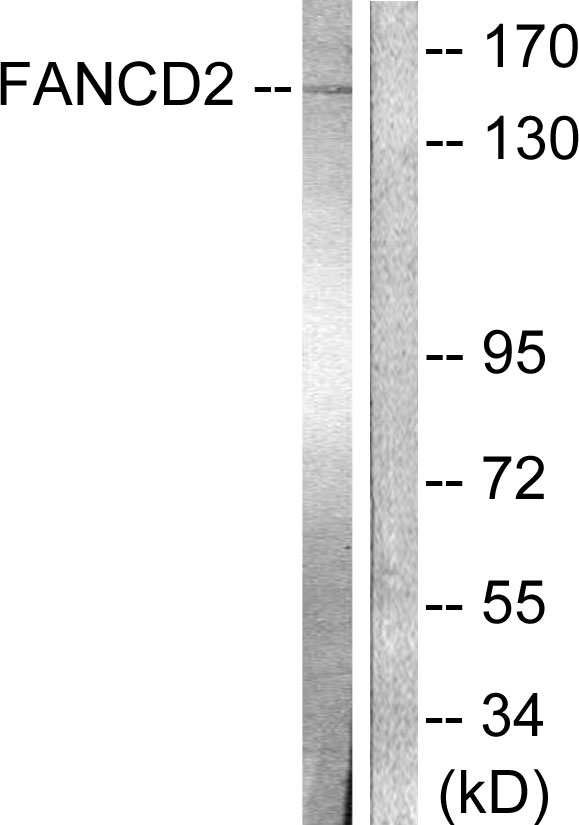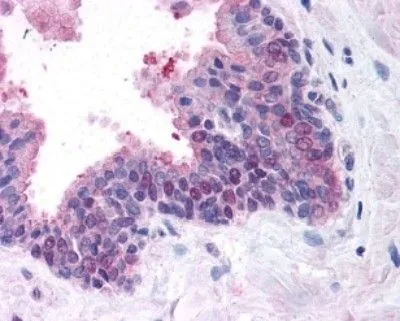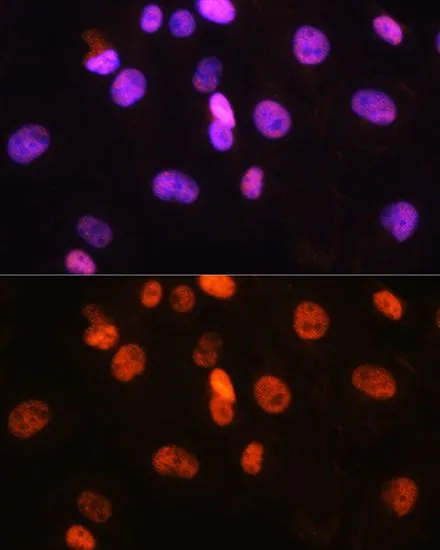![WB analysis of mouse testis tissue lysate using GTX01531 FANCD2 antibody [GT1223]. Dilution : 1:1000 Loading : 25 μg WB analysis of mouse testis tissue lysate using GTX01531 FANCD2 antibody [GT1223]. Dilution : 1:1000 Loading : 25 μg](https://www.genetex.com/upload/website/prouct_img/normal/GTX01531/GTX01531_20200508_WB_w_23053121_554.webp)
WB analysis of mouse testis tissue lysate using GTX01531 FANCD2 antibody [GT1223]. Dilution : 1:1000 Loading : 25 μg
FANCD2 antibody [GT1223]
GTX01531
ApplicationsWestern Blot
Product group Antibodies
ReactivityHuman, Mouse, Rat
TargetFANCD2
Overview
- SupplierGeneTex
- Product NameFANCD2 antibody [GT1223]
- Delivery Days Customer9
- Application Supplier NoteWB: 1:500 - 1:2000. *Optimal dilutions/concentrations should be determined by the researcher.Not tested in other applications.
- ApplicationsWestern Blot
- CertificationResearch Use Only
- ClonalityMonoclonal
- Clone IDGT1223
- ConjugateUnconjugated
- Gene ID2177
- Target nameFANCD2
- Target descriptionFA complementation group D2
- Target synonymsFA-D2, FA4, FACD, FAD, FAD2, FANCD, Fanconi anemia group D2 protein, Fanconi anemia complementation group D2
- HostRabbit
- IsotypeIgG
- Protein IDQ9BXW9
- Protein NameFanconi anemia group D2 protein
- Scientific DescriptionThe Fanconi anemia complementation group (FANC) currently includes FANCA, FANCB, FANCC, FANCD1 (also called BRCA2), FANCD2, FANCE, FANCF, FANCG, FANCI, FANCJ (also called BRIP1), FANCL, FANCM and FANCN (also called PALB2). The previously defined group FANCH is the same as FANCA. Fanconi anemia is a genetically heterogeneous recessive disorder characterized by cytogenetic instability, hypersensitivity to DNA crosslinking agents, increased chromosomal breakage, and defective DNA repair. The members of the Fanconi anemia complementation group do not share sequence similarity; they are related by their assembly into a common nuclear protein complex. This gene encodes the protein for complementation group D2. This protein is monoubiquinated in response to DNA damage, resulting in its localization to nuclear foci with other proteins (BRCA1 AND BRCA2) involved in homology-directed DNA repair. Alternative splicing results in multiple transcript variants. [provided by RefSeq, Feb 2016]
- ReactivityHuman, Mouse, Rat
- Storage Instruction-20°C or -80°C,2°C to 8°C
- UNSPSC12352203

![WB analysis of various samples using GTX01531 FANCD2 antibody [GT1223]. Dilution : 1:1000 Loading : 25 μg WB analysis of various samples using GTX01531 FANCD2 antibody [GT1223]. Dilution : 1:1000 Loading : 25 μg](https://www.genetex.com/upload/website/prouct_img/normal/GTX01531/GTX01531_20200508_WB_1_w_23053121_213.webp)
![Various whole cell extracts (30 μg) were separated by 5% SDS-PAGE, and the membrane was blotted with FANCD2 antibody [GT1223] (GTX01531) diluted at 1:1000. The HRP-conjugated anti-rabbit IgG antibody (GTX213110-01) was used to detect the primary antibody. Corresponding RNA expression data for the same cell lines are based on Human Protein Atlas program. Various whole cell extracts (30 μg) were separated by 5% SDS-PAGE, and the membrane was blotted with FANCD2 antibody [GT1223] (GTX01531) diluted at 1:1000. The HRP-conjugated anti-rabbit IgG antibody (GTX213110-01) was used to detect the primary antibody. Corresponding RNA expression data for the same cell lines are based on Human Protein Atlas program.](https://www.genetex.com/upload/website/prouct_img/normal/GTX01531/GTX01531_4000000172_20200410_WB_TPM_watermark_w_23053121_365.webp)

![Wild-type (WT) and FANCD2 knockout (KO) HeLa cell extracts (30 μg) were separated by 5% SDS-PAGE, and the membrane was blotted with FANCD2 antibody [103] (GTX70299) diluted at 1:500. The HRP-conjugated anti-mouse IgG antibody (GTX213111-01) was used to detect the primary antibody.](https://www.genetex.com/upload/website/prouct_img/normal/GTX70299/GTX70299_41330_20180413_WB_KO_watermark_w_23061221_975.webp)
![FANCD2 antibody [6]](https://www.genetex.com/upload/website/prouct_img/normal/GTX70314/FANCD2-antibody-6-GTX70314-WB-1_w_23061221_737.webp)



